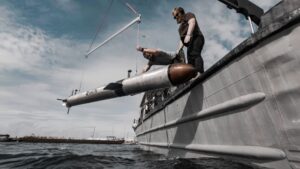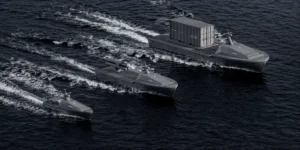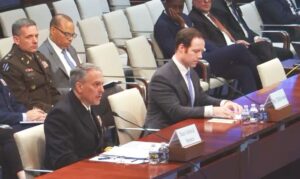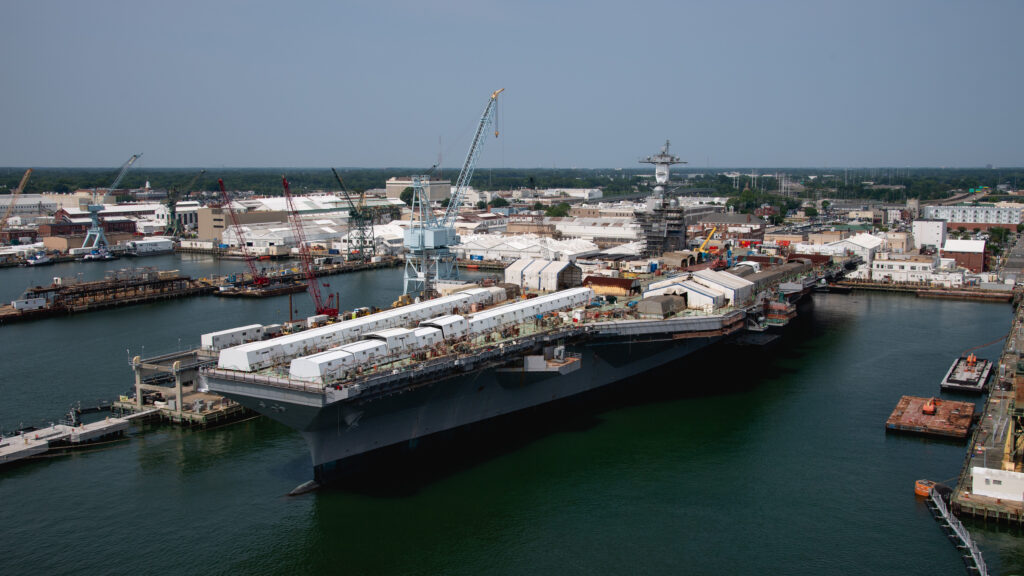Defense Daily
-
 Unmanned Systems
Unmanned SystemsDIU Wants Low-Cost UUVs For Kinetic, ISR Effects
The Defense Innovation Unit (DIU) has issued a new solicitation seeking low-cost unmanned underwater vehicle (UUV) solutions for separate problem sets, one-way attack and intelligence, surveillance, and reconnaissance (ISR) support […]
Tagged in: -
 Business/Financial
Business/FinancialDoD Spending On Startups Doubles But Remains Scant Overall, SVDG Report Says
Spending by the Defense Department in 2024 on the top 100 startups with dual-use and defense technology more than doubled versus 2023 but remains less than 1 percent of the […]
Tagged in: -
 Pentagon
PentagonDefense Department Seeks Public Input On Trump’s Acquisition Reform Order
The Defense Department on Wednesday asked for public comment on a presidential directive to reform how the department acquires stuff, including mandating a preference for commercial solutions. The public has […]
Tagged in: -
 Air Force
Air ForceMissiles and Munitions Top USAF Unfunded Priorities List
Missiles and munitions dominate the U.S. Air Force’s fiscal 2026 unfunded priorities list (UPL). At the top is $300 million for the AIM-260 Joint Advanced Tactical Missile (JATM) by Lockheed […]
-
 Congress
CongressHouse Panel Continues Probe on Counter-Drone Efforts at U.S. Bases
Last month, Rep. William Timmons (R-S.C.), the chairman of the House Committee on Oversight and Government Reform’s military and foreign affairs panel, asked DoD, the Department of Justice, and the […]
-
Wednesday, July 9, 2025
- Second Ford-Class Carrier Running Another 20 Months Late, Third Adds 10 More Months In Budget Books
- Army Aims To Deliver 10,000 Small Drones Over A Year That Each Cost Under $2,000
- Group of Retired USAF Flags Urge Continuation of Wedgetail, Increased F-35 Buy
- Trump Confirms U.S. Has Resumed Sending ‘Primarily’ Defensive Weapons To Ukraine
- Lockheed Martin Helping Havoc AI To Speed USV Development
- Imagery Support for Ukraine in “Early Access” Agreement by BlackSky
- SDA Names Dr. Gurpartap Sandhoo as New Deputy Director
- Maxar Nabs $205 Million In International Contracts For Defense And Intel Capabilities
-
Wednesday, July 9, 2025
- Second Ford-Class Carrier Running Another 20 Months Late, Third Adds 10 More Months In Budget Books
- Army Aims To Deliver 10,000 Small Drones Over A Year That Each Cost Under $2,000
- Group of Retired USAF Flags Urge Continuation of Wedgetail, Increased F-35 Buy
- Trump Confirms U.S. Has Resumed Sending ‘Primarily’ Defensive Weapons To Ukraine
- Lockheed Martin Helping Havoc AI To Speed USV Development
- Imagery Support for Ukraine in “Early Access” Agreement by BlackSky
- SDA Names Dr. Gurpartap Sandhoo as New Deputy Director
- Maxar Nabs $205 Million In International Contracts For Defense And Intel Capabilities
-
 Army
ArmyArmy Aims To Deliver 10,000 Small Drones Over A Year That Each Cost Under $2,000
The Army has laid out plans to deliver thousands of small drones over the next year, with an interest in systems that each cost less than $2,000. A new sources […]
-
 Navy/USMC
Navy/USMCSecond Ford-Class Carrier Running Another 20 Months Late, Third Adds 10 More Months In Budget Books
The Navy’s fiscal year 2025 budget request shipbuilding budget documents revealed the next two Ford-class aircraft carriers will be another 20 and 10 months late, respectively. The future USS John […]
Tagged in: -
 Business/Financial
Business/FinancialLockheed Martin Helping Havoc AI To Speed USV Development
HavocAI on Tuesday said it is collaborating with Lockheed Martin’s [LMT] Ventures unit to accelerate the development and production of autonomous medium unmanned surface vessels (mUSVs). Lockheed Martin Ventures typically […]

